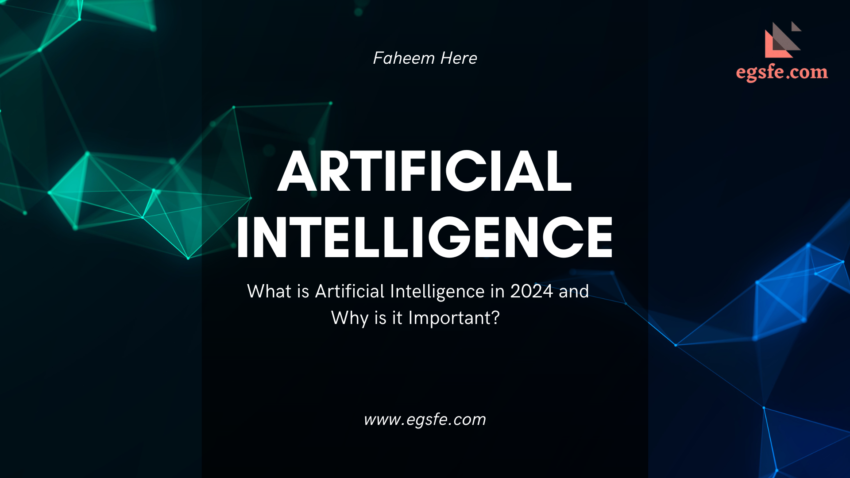Artificial intelligence (AI) is currently one of the hottest buzzwords in technology, and for good reason. In recent years, some innovations and developments that were previously the stuff of science fiction have slowly become reality. Here on this site, egsfe.com provides you with the best and 100% real authentic content about especially artificial intelligence and everything you need.
Experts see AI as a factor of production that has the potential to open up new sources of growth and change the way we work across all industries. For example, this PWC article predicts that AI could contribute $15.7 trillion to the global economy by 2035. China and the United States are expected to benefit most from the coming AI boom, accounting for nearly 70% of the global impact.
Why AI is Important in 2024
Artificial intelligence 2024 has been a hot topic in popular and scientific culture and could transform business and the relationship between humans and technology. Why is AI Becoming More Popular Today?
AI adoption is growing faster than ever, driven by the proliferation of data and the advancement of other innovations in cloud processing and computing power. Businesses now have unprecedented access to data, including dark data, that they never knew existed.
Rapid problem solving
AI’s ability to process massive amounts of data at blazing speeds is improving our ability to solve problems. From scientific research to business analytics, AI is accelerating decision-making processes, and driving innovation and progress.
Agility and competitive advantage
Artificial intelligence isn’t just increasing efficiency and simplifying tedious tasks. AI applications can learn from data and deliver near-real-time results by analyzing new information from multiple sources and adapting accordingly, with an accuracy that’s invaluable to businesses. (Product recommendations are a great example.) AI’s self-learning and optimization capabilities are delivering ongoing business benefits.
Advances in healthcare
Artificial intelligence is critical to drug discovery, medical diagnostics, and personalized treatment plans. This leads to more accurate diagnoses, faster drug development, and better patient outcomes.
Weak AI vs. Strong AI
When we talk about artificial intelligence (AI), we often distinguish between two main categories: weak AI and strong AI. Let’s take a look at the characteristics of each type:
Weak AI (strict AI)
Weak AI refers to AI systems that are designed to perform specific tasks and are limited to those tasks. These AI systems are characterized by their specific functions but do not have general intelligence. Voice assistants such as Siri or Alexa, recognition algorithms, and image recognition systems are examples of weak AI. Weak AI operates within predefined boundaries and cannot generalize outside its specialized domain.
Strong AI (general artificial intelligence)
Strong AI, also known as general AI, refers to AI systems that have or exceed human intelligence in a variety of tasks. A strong artificial intelligence will be able to understand, reason, learn, and apply solutions to complex problems in a way that is similar to human perception. However, the development of strong AI is still largely theoretical and not yet realized.
How does artificial intelligence (AI) work?
Developing an AI system involves reverse engineering human capabilities and characteristics into a machine and using its computing power to outperform our own. Machine Learning (ML): Machine learning teaches a machine to make inferences and decisions based on past experiences. Identify patterns and analyze the latest data to determine the meaning of these data points and draw a possible conclusion without relying on human experience. To learn the basics, you can sign up for a free machine-learning course designed for beginners.
1. Computer vision
Computer vision algorithms attempt to understand an image by breaking it down and looking at different aspects of the object. This allows the machine to classify and learn from images and improve output decisions based on previous observations. Cognitive computing algorithms attempt to mimic the human brain by interpreting text, and speech. These machines first collect data and then expand their memory. They have enough memory or experience to make good decisions, but their memory is minimal. For example, this machine can suggest a restaurant based on the collected location data.
2. Theory of Mind
This type of AI can understand thoughts and emotions and even communicate socially. However, such a car has not yet been built.
3. Consciousness
Confident cars are the next generation of these new technologies. You will be intelligent, sensitive, and conscientious.
Artificial Intelligence (AI) Predictions for 2024:
The AI market is growing thanks to new creations and innovative features. For example, the chatbot market is expected to reach around $1.25 billion by 2025, up from $190.8 million in 2016. As a result, we will see an increase in AI applications across industries over time. 2024 is expected to be a turning point for AI and we are excited to share our predictions with you.
1. AI for Personalization
In 2024, personalization will be key. Artificial intelligence will be crucial for delivering personalized customer experiences, whether it’s personalizing electronic content, customizing marketing campaigns, or recommending commercial products based on individual preferences.
2. AU Ethics & Regulation
As the influence of AI grows, so too will the demand for ethical AI development and responsible use. In 2024, there will be a greater emphasis on setting standards and regulations to protect privacy and fairness in the use of AI technology.
3. AI-driven business strategies
By 2024, we expect a significant shift toward AI-driven business strategies. More and more companies will prioritize AI as a critical part of their operations, from chatbots for customer service to optimizing supply chain logistics. Companies that fail to adapt risk falling behind.
4. AI in project management
Artificial intelligence in project management will enable managers to manage their projects more effectively in 2024. For example, day-to-day project development tasks can be automated using AI-powered tools. In addition, these tools provide effective platforms to facilitate communication between team members.
Examples of AI applications in project management:
- UA in banking
- Knowledge-based expert system (KBES).
- Automation of risk assessment in project development.
- AI-enabled chatbots.
5. AI in cybersecurity
As cyber threats increase, AI will take the lead in strengthening cybersecurity. Machine learning algorithms are improving their ability to detect and contain threats, ensuring the safety of sensitive data.
6. AI in Education
AI-powered educational tools and personalized learning experiences will revolutionize the way students learn. From intelligent teachers to customized curricula, AI will play a crucial role in education.
7. AI-Powered Data Analytics
The demand for actionable insights will drive the integration of AI into data analytics. Advanced machine learning models will help companies classify massive data sets to make better decisions and gain a competitive edge.
8. AI-Powered Sustainability
AI will be an effective tool for solving environmental problems. Artificial intelligence will help companies become more sustainable by optimizing energy consumption and reducing waste.
9. AI in Social Media
Social media uses artificial intelligence (AI) to analyze data and identify trending hashtags, posts, tweets, and more. Additionally, AI enables websites to provide users with personalized experiences based on their behavior.
Examples of AI applications in social media:
- Twitter uses AI to remove hate speech. User-focused posts on Instagram’s Discover tabs.
10. AI in healthcare
With AI-based diagnostics, drug discovery, and predictive analytics, the healthcare industry will see significant adoption of AI. This will not only improve patient care but also save costs. Examples of AI applications in healthcare:
- Surgery and robotic surgeries. Automation of administrative activities.
- Monitoring patient health status.
Automation will lead to greater efficiency and productivity. Companies are using artificial intelligence to automate repetitive tasks, freeing up staff to focus on more strategic and creative projects.
11. AI in marketing
Artificial intelligence automates data processing to improve decision-making. As a result, the marketing industry has helped companies develop effective marketing campaigns by providing personalized experiences to customers.
Examples of AI applications in marketing:
- Personalized ads on websites and mobile apps.
- Smart typing in Google Docs and Gmail
- Creating video lessons
12. AI in automation
Automation will increase efficiency and productivity. Companies are using artificial intelligence to automate repetitive tasks, freeing up staff to focus on more strategic and creative projects.
13. AI in Banking
Financial and banking institutions are now integrating AI into their IT systems to ensure effective customer support. In addition, artificial intelligence is being widely used throughout the banking system to detect transaction anomalies and fraud.
Applications of AI in Banking:
- lVirtual assistance and chatbot for customer support.
- Robo provides investment advice.
- cybersecurity to prevent external threats.

